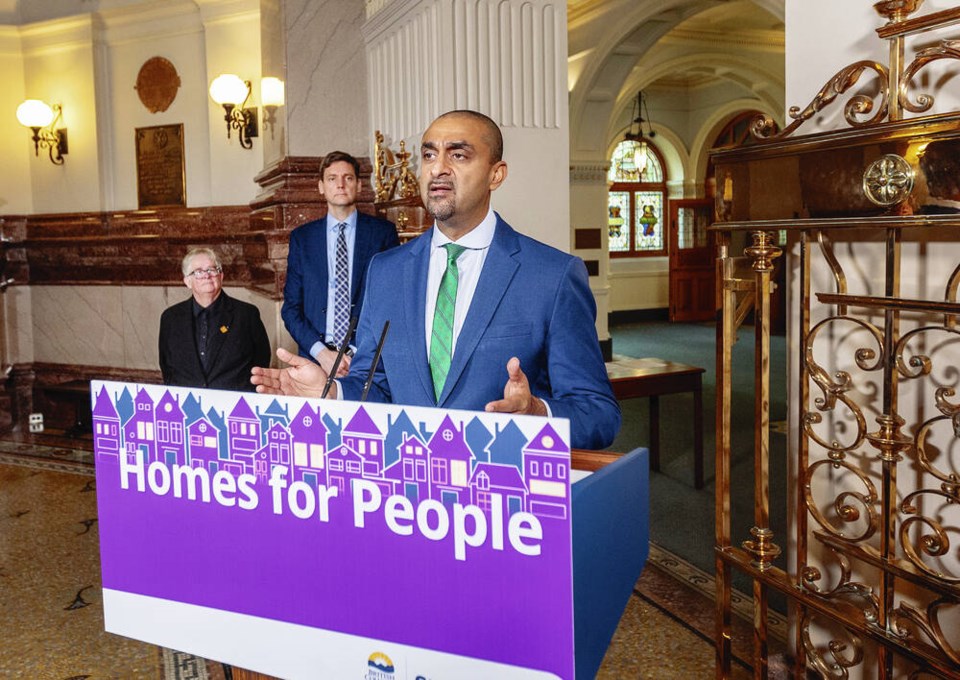The practice of one owner holding a stable of short-term rental units is coming to an end, as the province brings in legislation aimed at sending thousands of such units back into the long-term rental market.
Housing Minister Ravi Kahlon said the goal is not to target hosts who rent out their homes while they’re on vacation, or rent out a room on Airbnb.
“But those of you that are renting out dozens of short-term rentals to make a huge profit while taking away homes from people — you should probably be thinking about a new profit scheme in the very near future.”
As of May 1, short-term-rental units in communities with more than 10,000 people will be allowed only in the principal residence of the host, plus one secondary suite or laneway home.
Affected communities include those within the capital region and others on Vancouver Island, including Nanaimo, Port Alberni, Parksville, Comox, Campbell River and Courtenay.
The average vacancy rate in these communities is 1.7 per cent, said Kahlon, adding that in many, it is “much, much lower.”
Communities with a vacancy rate of more than three per cent can apply to opt out of the principal-residence requirement.
Certain communities next to larger centres will be subject to the primary-residence requirement, including Qualicum Beach, Metchosin, Duncan, Cumberland, and the Highlands.
The principal-resident rule does not apply to specified resort areas and small municipalities.
A raft of measures is set out in legislation introduced Monday to open up more housing at a time when affordable housing is difficult to find.
The province said nearly half of all operators of short-term rentals have multiple listings.
In Victoria, 42 per cent of short-term rental licences are held by out-of-town operators.
B.C. has experienced a surge in short-term rental units, Kahlon said. It’s estimated that more than 16,000 homes in the province are being listed as short-term rentals.
The province is removing a provision that allowed properties that were being used as short-term rentals to keep that status after restrictive bylaws came into effect. It’s estimated that Victoria has about 1,600 units that were deemed legal non-conforming, but will no longer be able to operate as short-term rentals.
The legislation boosts fines and enforcement and adds tools for local governments, which have asked for more effective ways to deal with short-term rentals, Kahlon said.
Municipalities will be able to impose fines of $3,000 per day for infractions, up from $1,000 per day.
About 30 local governments have already passed short-term rental bylaws, but have found enforcing them difficult.
Now, online short-term rental platforms will be required to give the province data about their hosts’ listings that will be shared with local governments.
Those platforms will have to take down listings promptly if the operators don’t have a business licence or provincial registration.
Regional districts will have the authority to issue business licences for short-term rentals.
A new provincial enforcement unit will be set up to ensure rules are followed, and a provincial host and platform registry will be established by late 2024.
“This is incredibly important to see the provincial government stepping in and being able to begin regulating short-term rentals throughout B.C.,” said Victoria Mayor Marianne Alto.
The city toughened up its short-term rental policies last month, boosting fines and limiting the number of times a home can be booked per year.
New provincial policies “will ease the burden on municipalities like Victoria that have local policies aimed at maximising a local housing supply but which have struggled with trying to balance the number of short-term rentals that we have with that aim,” Alto said.
The city is particularly pleased with the data-sharing requirement, which will help it enforce municipal regulations, Alto said. “The enforcement and compliance piece is incredibly important.”
Premier David Eby said the province is taking strong action to “rein in profit-driven mini-hotel operators, create new enforcement tools and return homes to people who need them.”
“Without question, the short-term rentals have gotten out of control.”
The province estimates that about half of short-term rental are not complying with municipal licensing rules, he said.
In Tofino, Mayor Dan Law said adding regulations, making sure data is correct and sharing it between governments, and enhancing enforcement tools will all help municipalities.
Law said he expects the province’s actions will “shift many commercialized homes back into the long-term housing market.”
Paul Nursey, chief executive of Destination Greater Victoria, praised the province’s new rules, saying with five new hotels in the pipeline downtown and others in the works, the accommodation sector does not need short-term rentals.
Walt Judas, chief executive of the Tourism Industry Association of B.C., said a shortage of housing for workers is a major issue for tourism operators in B.C., and is largely due to the proliferation of short-term rentals in B.C.
However, Alex Howell, policy manager for Airbnb in Canada, said the province’s initiative won’t alleviate the shortage of affordable housing.
Instead, Howell said, it will “take money out of the pockets of British Columbians, make travel more unaffordable for millions of people who travel within B.C., and reduce tourism spending in communities where hosts are often the only providers of local accommodations.”
“We hope the B.C. government will pursue more sensible regulation and listen to the many residents — hosts, travellers and businesses — that will be impacted by the proposed rules,” Howell said.
>>> To comment on this article, write a letter to the editor: [email protected]



